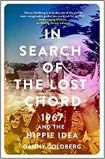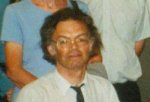In Search of the Lost Chord: 1967 and the Hippie Idea by Danny Goldberg
| In Search of the Lost Chord: 1967 and the Hippie Idea by Danny Goldberg | |
|
| |
| Category: History | |
| Reviewer: John Van der Kiste | |
| Summary: Aged sixteen in 1967, Danny Goldberg looks back on the time of a 'rendezvous with destiny', the high point of mass popular American culture, and how it came about. Though his focus is chiefly on American politics, events and media, he also looks at parallel happenings in London, and has written an enlightening portrait of the year after which nothing was ever quite the same again. | |
| Buy? Yes | Borrow? Yes |
| Pages: 280 | Date: July 2017 |
| Publisher: Icon Books | |
| ISBN: 978-1785782954 | |
|
| |
In 1967, Danny Goldberg was a wide-eyed lad of sixteen, and as he tells us there really was a moment when 'peace and love' was not meant or taken ironically. Echoing a speech some years earlier by Franklin D. Roosevelt, for him it was a 'rendezvous with destiny', a high point of mass popular American culture. The quest to discover where it came from and where it went is the purpose of this book.
It is not a straightforward retelling of what happened throughout the year, but rather 'a subjective and highly selective history' as he recalls the events and personalities which shaped it, 'the lost chord', a time that he was 'not cool enough to have been a part of' but that left an indelible impression on his formative years and on western civilisation, which was never quite the same again. In doing so he takes us on a journey of political struggles, revolutions and counter-revolutions, the 'hippie' phenomenon which was embraced by many and subsequently denounced by left-wing historians who denounced it as no more than an escapist sideshow. While he writes from an unashamedly New York perspective, he embraces the counter-cultural developments from London, California and above all San Francisco. Can anybody of the right generation think of the year, the city name and not hear Scott McKenzie's time-honoured song about being 'sure to wear some flowers in your hair' in their mind?
Not everything started in 1967. He takes the previous year as a Launchpad, beginning with the opening of the Psychedelic Shop in Haight-Ashbury (the birthplace of the hippie community), the first of hundreds of 'head shops' specialising in books on eastern religion and the occult, records of Indian music, beads, incense, posters, pipes and the like. It was followed by the launch of the San Francisco Oracle, a manifesto for the new generation with its brightly coloured psychedelic art and essays about the counter-culture. He has researched deeply, interviewed many of the architects of the age including Allen Ginsberg, Timothy Leary and Gil Scott-Heron, as well as gone back to files of the underground newspapers. In doing so he has constructed a compelling picture of what it was really like in the age which saw the Summer of Love, LSD (only made illegal shortly before), and the Monterey Pop Festival. It was also the time of Muhammad Ali's conviction for draft avoidance and Martin Luther King Jr's public opposition to the war in Vietnam, of the Six-Day War, Black Power and the killing of Che Guevara, the face that would adorn many a student poster over the next few years, and so legend has it, the man who quipped that if you asked American leftists to form a firing squad, they would get into a circle.
For many of us, the year is inseparable from the music, and there is due attention to The Beatles' 'Sergeant Pepper's Lonely Hearts Club Band', and the first albums by Jimi Hendrix, The Doors, The Grateful Dead, and Janis Joplin. Although he was having a quiet year away from the public gaze, Bob Dylan was recording yet another landmark album, 'John Wesley Harding', while his Scottish rival Donovan was making waves as another of the founding fathers of folk-rock. Significantly, perhaps, there is no mention of The Rolling Stones, 1967 being one year they would probably prefer to forget. The first issue of 'Rolling Stone' was published, although it owed its name to a song by Dylan, not the group.
Over the space of a few months, to continue with the simile, the chord was indeed lost. The older intellectuals and radicals distanced themselves from the hippie ideal for various reasons, one being that they were evidently not political enough. 1967 would remain frozen in time as bright new morning, to be eclipsed by the dark days of 1968, the year of the assassinations of Martin Luther King and Robert Kennedy, of escalating demonstrations against the Vietnam War in America and even briefly in London.
For handy reference, the book ends with a four-page timeline of major political, cultural and musical events throughout the year.
So was the year just a glitterball in the second half of the century, a period of twelve months to be celebrated as an exercise in nostalgia, or did it change anything for the greater good of mankind? The epilogue suggests that it did. American environmentalism may have started over a hundred years earlier with essayist and naturalist Henry David Thoreau, but the activists of 1967 took it further. Without them there might never have been an Earth Day or an Earth Day Network, and the World Health Organisation might not have had the benefit of some of the activists helping to provide new services in poorer parts of the world.
As the old cliché says, 'If you remember the sixties, the you weren't really there'. As one who is a few years younger than Goldberg, I can remember the sixties from the rather restricted viewpoint of one still at school, although I was dimly aware that it was something of a pivotal year after which in many ways life would never be quite the same again. It might be argued from the British perspective that this book tells us rather more about what was happening on the other side of the Atlantic, although there are references to parallel happenings in London. Having said that, it is a valuable, enlightening portrait of the age, from which I for one learned a good deal.
For further reading, The Sixties by Jenny Diski is a concise, lively and opinionated look at the decade, while In The Seventies: Adventures in the Counterculture by Barry Miles, rather less relevant but worth attention is written from the premise that the sixties lasted from 1963 to 1977; and for a sidelight on the alternative lifestyle, we also recommend Magic Bus: On the Hippie Trail from Istanbul to India by Rory MacLean.
Please share on: ![]() Facebook,
Facebook, ![]() Twitter and
Twitter and
![]() Instagram
Instagram
![]() You can read more book reviews or buy In Search of the Lost Chord: 1967 and the Hippie Idea by Danny Goldberg at Amazon.co.uk Amazon currently charges £2.99 for standard delivery for orders under £20, over which delivery is free.
You can read more book reviews or buy In Search of the Lost Chord: 1967 and the Hippie Idea by Danny Goldberg at Amazon.co.uk Amazon currently charges £2.99 for standard delivery for orders under £20, over which delivery is free.
![]() You can read more book reviews or buy In Search of the Lost Chord: 1967 and the Hippie Idea by Danny Goldberg at Amazon.com.
You can read more book reviews or buy In Search of the Lost Chord: 1967 and the Hippie Idea by Danny Goldberg at Amazon.com.
Comments
Like to comment on this review?
Just send us an email and we'll put the best up on the site.


